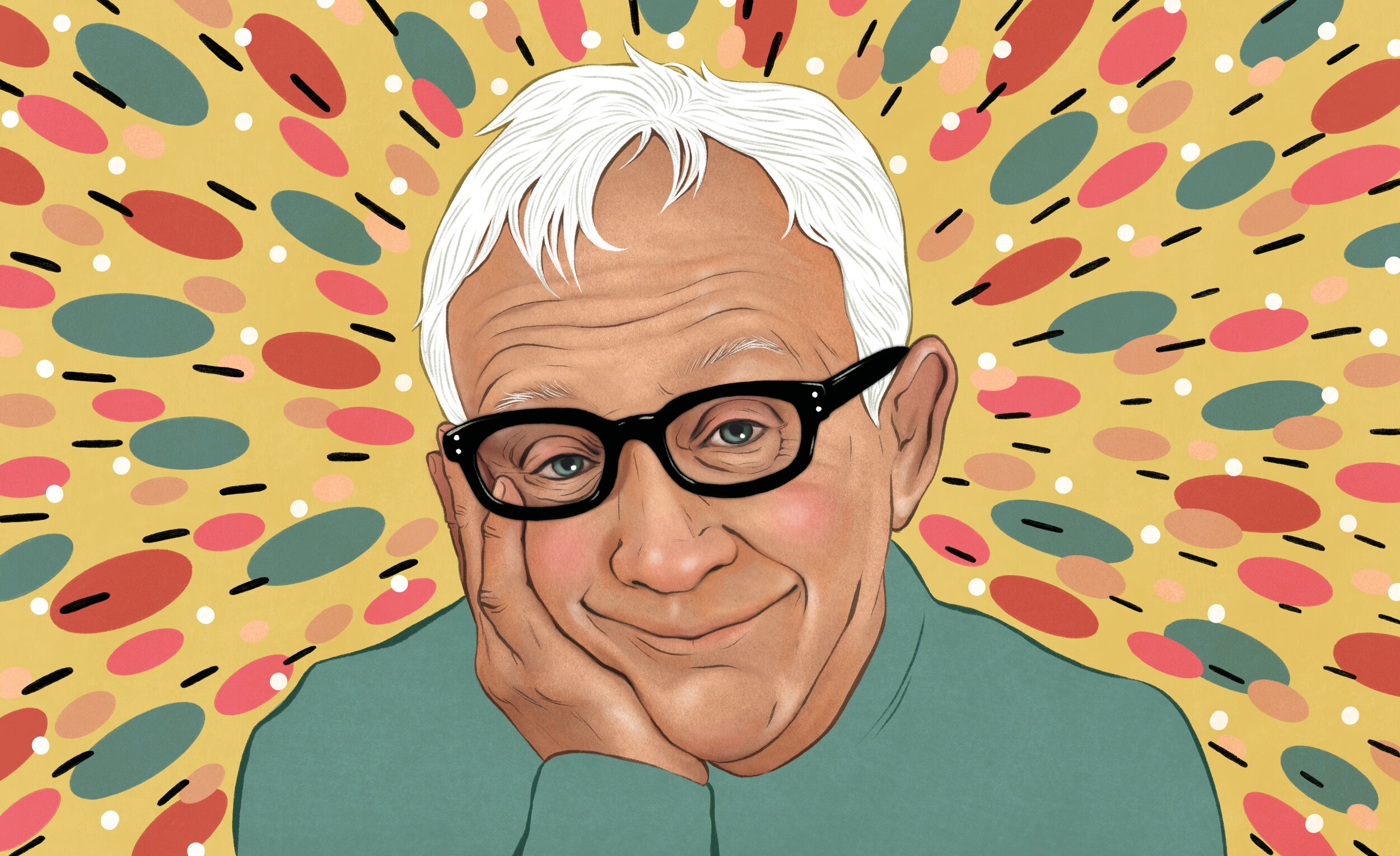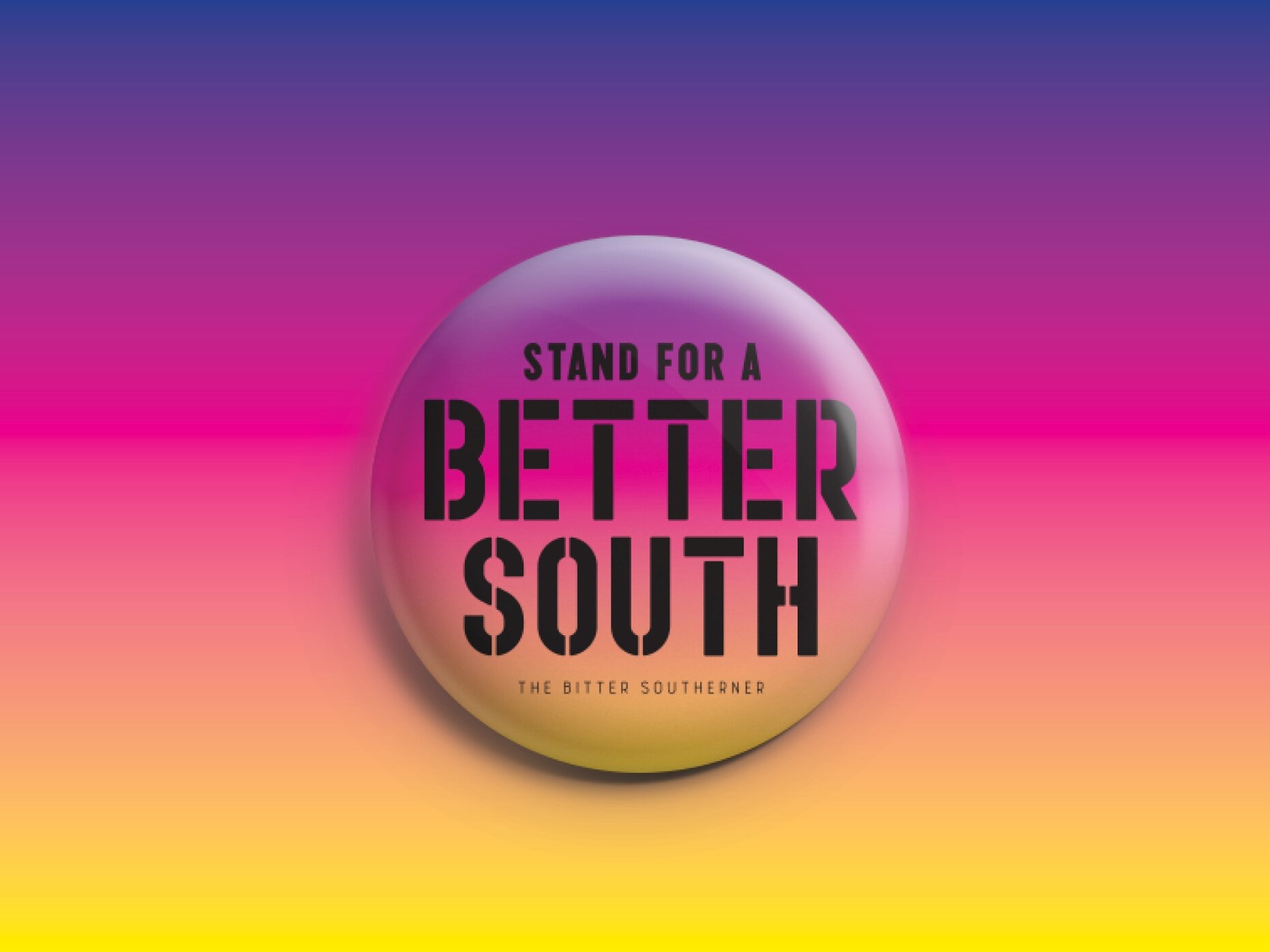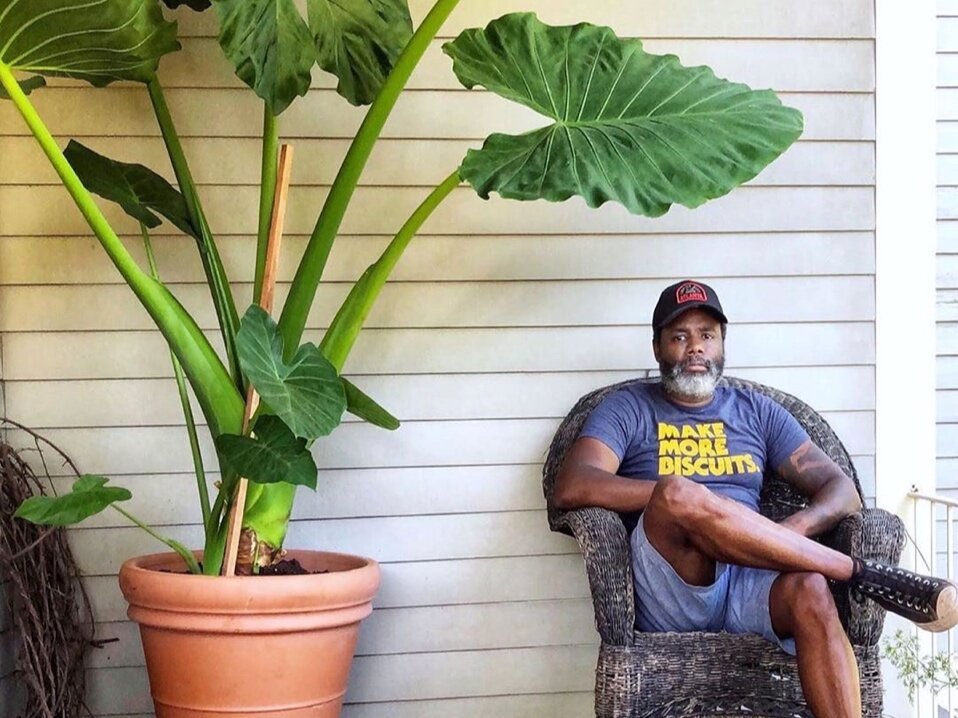Soft spoken, short and funny are the things that make Leslie Jordan so wildly successful and charming. But as a kid growing up gay in Chattanooga, Tennessee, it made him the target of bullies. He found refuge in the 1970’s Atlanta drag scene. As Atlanta celebrates Atlanta Pride online this year, we kick off the celebration with this profile.
Story by Martin Padgett | Illustration by Abigail Giuseppe
Leslie Jordan lunges first. "Karen Walker. I thought I smelled gin and regret."
He parries, a deadpan aimed with deadly accuracy at his nemesis. His voice is ballistic, unexpected, a fusion of country twang and Capote preen.
"Beverley Leslie. You look more like a woman every time I see you,” Megan Mullally stabs back. Her piercing voice is her épée, her only necessary weapon apart from a raised eyebrow. They fence with insults, steal scenes with each verbal riposte.
On television, Jordan’s fey snarl gets big laughs. It won him an Emmy in 2006, as a guest actor in “Will & Grace.” Growing up in conservative east Tennessee, it shamed him.
"The first time I heard my voice recorded, I was mortified," he says. At 12 years old, listening to himself on a tape recorder, he didn't hear a boy on the verge of becoming a man. He heard Butterfly McQueen, right out of “Gone with the Wind.” Prissy.
Jordan’s voice still sounds brightly effete, if slightly hoarse. Without the pre-written barbs it is full of light, and prone to breaking into show tunes where they move the story along more swiftly than words alone. It emanates from a white-haired man all of 4 feet 11 inches tall, about the same height as Dolly Parton.
Dolly claims only to be inspired by drag queens. For a time, Jordan was one.
Jordan grew up gay in the South. Where he grew up, in east Tennessee, men were firefighters, police officers, or Army pilots. They didn't dig into their mother's clothes with a friend while she was out. They didn’t put on her wig upside down for a fuller effect. They didn’t slip into her high heels. They didn’t use her hairbrush as they sang along with Diana Ross & The Supremes, taking all the best parts.
“Are you going to be the backup girl?” he told his friend during the solos. “Then back the fuck up!”
His family knew. His champagne-blonde mother Peggy Ann Jordan and his red-velvet grandmother protected him and his dreams of being a majorette, even taught him how to twirl a baton. They built a secret garden where he could play with dolls; his father bought him one for Christmas one year. They could protect Leslie in their home, but not when he ventured farther.
"I didn't think I was effeminate," he says. But, he knew he was different in a dreadful way. Boys called him fag and queer and pussy boy — the perfectly rhythmic taunts engineered by young human brains.
Though his father knew, too, he avoided the obvious. Army pilot Lieutenant Colonel Allen Bernard Jordan died in a plane crash in 1967. Young Leslie Jordan took it for gospel that his father died ashamed of him. Jordan was an inch too short to get into the Army. He played with dolls. He wore dresses in secret. They were the uniform he chose, instead of the uniform his father wore.
Then there was his voice.
Rebellion takes many forms. After his father died, Jordan practiced nearly all of them. At 14 years old, Leslie read Joan Didion’s Slouching Towards Bethlehem, and worried San Francisco's post-Summer of Love haze had passed him by. Jordan took amphetamines because, he says, he found out pretty quickly it was a lot easier to deal with being gay when he was high.
He listened to WFLI, "The Black Spot On Your Dial!" He made friends with the Black students bused in increasing numbers to Brainerd High School. Blondell Roddy, a classmate, called him Itty Bitty, and taught him how to dance her dances.
Roddy protected him when riots erupted at Brainerd. The school had opened in 1960, on the white side of town. Its red bricks still gleamed along rectilinear lines, a modern temple to learning. The halls teemed with white students, even though President Eisenhower desegregated the schools in Little Rock, Arkansas in 1957. Eventually, and reluctantly, more than a decade later, Chattanooga followed suit. By 1969 black faces mixed with white faces in Brainerd's yearbook, and many people hated that.
In 1969 Brainerd High’s mascot was the Rebel, and the Confederate flag waved during football games while the marching band played “Dixie.” Black students pushed back; they raised Black Power fists when the song played. Hundreds walked out. They burned the Confederate flag in protest.
"I love you but get your little white ass out of this part of the school," Blondell warned him one day.
Bricks whistled in the air. Baseball bats whuffed as they were swung in anger. Jordan jumped out of a broken window and ran.
When he was 17, Jordan stole his mother's charge card, took his mother’s red Chevy Monte Carlo with the excuse of going to the library, and bought a dress for himself. He then parked the car at the Cross Keys Lounge, a gay bar on the Black side of Chattanooga.
Repulsed and scared — he was the treasurer of the Spanish club! — he also was fascinated. He watched two men in full drag uniforms of dresses, full makeup, feather boas and stilettos make their way to the door and toward him. He nearly threw up on the sidewalk in fear.
“You’re trying to gather up the courage to go in that big, bad, gay bar, aren’t cha?” One performer said to him. “Come on and help me, Sister Sue. We’ve got to be good Samaritans and get this scared, helpless creature into his first gay bar!”
A drag queen on each arm, they marched him in. He enlisted in a new life. Inside, lawyers in suits drank cocktails next to women dressed like Elvis. The only thing they had in common was they were gay.
"I think I exhaled for the first time in my life," he recalls.
Jordan eventually decided to give drag a try himself. He adopted the name Miss Baby Wipes and performed a few times, once in a long dress he’d stolen from a hippie neighbor.
A neighbor found out — how, he doesn't remember — and outed him to his mother and stepfather who hired a Christian therapist.
Jordan flunked summer school. His parents drove to Florida for vacation and left him at home. While they tanned and rested, he readied himself for his escape. He pawned anything he could find of value and ran away to a new home. He ran away to Atlanta to be a drag queen. Still underage when he got there, he beelined for nightlife and got past the doors at the most famous drag show club of all, the Sweet Gum Head.
In Tennessee, the few drag queens he knew performed to Broadway tunes and pop songs and took humorous “booger drag” names. His hometown had one gay bar. People came inside and stayed until the midnight closing time. Where else would they go? Outside, they were pariahs.
In Atlanta, the Sweet Gum Head had opened just as the fury of Stonewall’s riots turned into action. It reigned over a half-dozen drag clubs. It had performers with professional acts, established audiences, and a growing interest from the straight world.
Jordan called it one of his homes. The Sweet Gum Head became an oasis, much as the city of Atlanta had become for rural Southern gay men and women surrounded by a hostile and dangerous South. For gay Southern men like a 4-foot-11 wannabe drag queen from Chattanooga, the Sweet Gum Head offered a utopia.
Still underage, he got past the doors at Atlanta's best-known show club. Inside, the most famous drag queen in Atlanta, Rachel Wells, had command of the stage and tore into Janis Joplin's garment-rending "Piece of My Heart." Joplin’s gods were bound to the earth by skin and bone, by passion and pain. Her agony was her ecstasy.
"I'd never seen that. Drag queens in Tennessee did Barbra Streisand or Judy Garland," Jordan says. "It just changed my life."
Jordan’s parents had tried to bring him back to Tennessee and enroll him in college, but Atlanta drew him in more tightly. It already was a gay nirvana when he arrived in 1973, and he promptly lost himself in a dragoon of men and a rush of drugs. He took black RJs — “truckers' speed” — and ate them like candy.
He lived in wretched cheap apartments, in the old Della-Manta, home to Margaret Mitchell in the decade between the “Gone with the Wind” premiere and her death in 1949. Prostitutes, drug dealers, and drag queens had replaced Scarlett and Neely. Jordan’s neighbors tripped on psychedelics while he took quaaludes.
His best friend called himself Lily White while performing in drag. Out of her mind on drugs most of the time, Lily would shave her head and glue pieces of a wig on it. She'd walk into a bar, act normal, then get up and lip sync Patsy Cline’s "Crazy" and begin pulling all her hair out while she screamed and rolled and writhed on the floor. It was brilliant; it got her a place in the Sweet Gum Head's weekend show. It was so good, it brought Jordan to a conclusion: He gave up on Miss Baby Wipes, hardly able to keep up with the inventive, groundbreaking drag his neighbors performed.
It kept the Sweet Gum Head at the top of his list, the first stop on his regularly scheduled tour of Atlanta's gay hotspots. Inside the Sweet Gum Head, he could watch Rachel Wells, Lily White, Lavita Allen and Satyn DeVille, some of Atlanta’s most accomplished female impersonators, night after speed-fueled night. He’d stay late enough to see the finale, when Alan Allison would step into the light, as Shirley Bassey swan-dove into her signature song, "This Is My Life."
"You could go 'til the sun came up, easily," he remembers. "You were mainly out to find sex, period. You were out to find somebody to take home. We were just gay, just free. There were no inhibitions anymore."
Jordan had found a place he belonged; he found a new home. The Sweet Gum Head became the new center of his universe. There was nothing outside of there that he could possibly have asked for, or wanted.
When the plague came, Jordan left Atlanta.
In 1981, the CDC documented 159 cases of what would soon become known as AIDS. A year later, 618 people in the U.S. had died. The patients of the epidemic displayed blue-brown blotches from Kaposi’s sarcoma, and struggled to breathe from pneumocystis. They visibly declined while their viral loads climbed. Often they were abandoned by their families, and were left to die alone. Within that decade that number of reported deaths reached more than 100,000 with more than 31,000 in 1990.
"We didn't know. People began to get sick and there was so much shame. It was just a horrible way to die," Jordan says. He used crystal meth and drank vodka constantly. “I buried an entire phone directory.”
Jordan retreated to L.A., already swept up in the panic of the initial phase of the AIDS epidemic. He reconnected with his best friend from Tennessee. Then he found out his backup singer from his earliest days of drag had been infected. He became his caretaker.
"What else did I have to do? At that point, my life had shrunk to almost nothing."
Jordan let his friend take extra pills, even smoke while using oxygen. One night, close to his end, he quietly asked Jordan a question.
“Leslie ... do you think I’m being punished?”
He held his gaunt, sickened childhood friend until the death rattle rose from his chest.
We grow up gradually, putting our traumas to bed when we can, nurturing our good, healing ourselves. Jordan lived as an “out” gay man for almost a quarter-century before he healed. He delivered food to AIDS patients, he nursed them as they passed, and he did it all as an addict. In 1996 he was sentenced to 120 days in Los Angeles County Men’s jail. “It was horrendous. Awful food, boredom and constant teasing from other inmates. I was let go for good behavior after 14 days. I had been told by the judge when he released me early that if I messed up, he would put me in jail for a year. That was out of the question.” With help from a court mandated outpatient program, 12 Step meetings, and a sponsor who walked him through the steps he was able to get and stay clean. “I have been sober ever since."
A year after he emerged from jail and addiction, scientists found the first effective combination treatments for HIV and AIDS. It saved a community from extinction.
His community — his universe — now lives with many of the threats of the past removed. For Jordan it means that the community is dissolving, conforming, changing.
In the 1970s, Pink Floyd's “Us and Them” had been an anthem, shorthand for the divide between the straight and gay worlds.
Now he says "us and them" describes a split in the gay universe. "Us" are the fortunate, who live in a "fabulous" demimonde of urban and coastal gay America, where gay is good, accepted, normal. "Them" is the other half of gay America, who live in rural places filled in with shadows and fear.
Jordan remembers that fear. At 6 years old he told his father he'd been picked on in Sunday school for his voice, his height, his manners. "They laugh at me,” he told his father.
His father soothed him. He told him he had a gift for making people laugh. He extracted a promise from Jordan: to never hide his light, to let it shine.
It shines in his one-man shows, in the reruns of “Will & Grace,” and in the Instagram universe he’s expertly commanding during the COVID-19 lockdown, all by simply being himself. He shares his family home with his mother, whom he says has always been his biggest fan. “She knew I would be successful long before I knew,” he says, “and she believed in me when I did not have enough sense to believe in myself.”
He’s comfortable going back home to Tennessee now. But would he consider going back to drag? Not quite. Without shame, he admits he never got on the stage at the Sweet Gum Head.
"I wasn't good enough," he chuckles.
Corrections 10/8/2020 8 a.m. : An earlier version of this article suggested that Jordan was from Knoxville and that he currently lives in Tennessee. Although he has spent several months this year with his mom in Chattanooga, his primary residence is still West Hollywood.
Martin Padgett is the author of the upcoming book A Night at the Sweet Gum Head: Drag, Drugs, Disco, and Atlanta's Gay Revolution, May 2021 from W.W. Norton. He earned his MFA in narrative nonfiction writing from the University of Georgia’s Grady College of Journalism and Mass Communication, and was named a 2019 Lambda Literary Fellow. He is a PhD student at Georgia State University. Marty lives in Atlanta and Pensacola Beach with his husband, two cats, and an overflowing file of future story ideas. He will forever be #TeamKatya.
Abigail Giuseppe is an illustrator, portrait painter, and pattern designer based outside of Washington, D.C., who loves bright warm colors, pop culture, and exploring historic landmarks. When Abigail isn’t drawing and painting, she can be found in the back corners of antique malls looking for odd plates to add to her collection or ordering her third espresso shot of the day.









